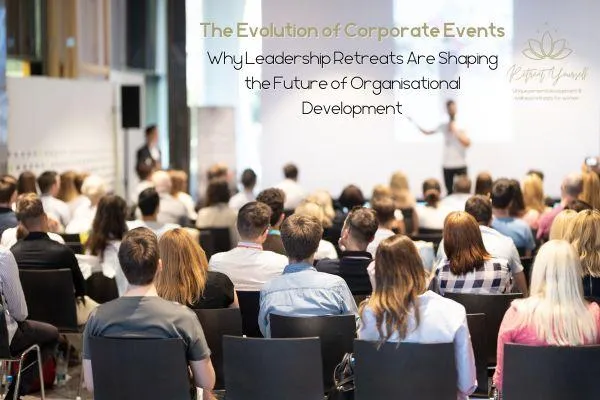


The Blog
from Retreat Yourself

The Evolution of Corporate Events: Why Leadership Retreats Are Shaping the Future of Organisational Development
I spent the first 15 years of my careers climbing the career ladder in the corporate rat race. As an L&D professional, I'm an Executive Coach and Leadership Development Consultant, I have had my fill of conference, strategy away days and the dreading team building events (that all anyone looks forward to is the pi** up in the bar in the evening!)... After another 15 years working freelance and also setting up my own boutique retreat agency I've noticed a big shift and it's a good one!
The corporate world is in the midst of a transformation. The way companies operate, engage with employees, and cultivate leadership has shifted dramatically in recent years. A significant aspect of this change is the evolving landscape of corporate events. Traditional large-scale conferences and meetings, once the mainstay of corporate culture, are being replaced by more intimate and immersive experiences, with corporate and leadership retreats taking centre stage. But what’s driving this shift, and why are retreats seen as the future of organisational development?
The Decline of Traditional Corporate Events
For decades, corporate events such as annual general meetings, large conferences, and product launches were seen as essential to building company culture, aligning on goals, and showcasing leadership. These events often involved bringing hundreds, if not thousands, of employees together in a single location. However, a few key factors have contributed to the decline of these traditional events:
1. The Rise of Remote Work: The COVID-19 pandemic accelerated the adoption of remote work, fundamentally altering how teams collaborate. With many employees now working from home, the need for large in-person gatherings has decreased. Virtual meetings and webinars have replaced many traditional events, offering flexibility and cost savings.
2. Cost Considerations: Hosting large-scale events is expensive. Companies have become more cost-conscious, especially in uncertain economic times. The expenses associated with travel, accommodation, and venue rentals have prompted organisations to reconsider the value of these events.
3. Environmental Concerns: There is growing awareness of the environmental impact of large gatherings. Corporate events often require significant travel, contributing to carbon emissions. As sustainability becomes a priority for businesses, the need to reduce their environmental footprint has led to a shift toward more sustainable alternatives.
4. Changing Employee Expectations: Today’s workforce values meaningful experiences over mere formalities. Employees are looking for opportunities to connect on a deeper level, develop personally and professionally, and engage in activities that align with their values. Traditional corporate events often fail to meet these expectations.
The Rise of Corporate and Leadership Retreats
In response to the changing landscape, companies are increasingly turning to corporate and leadership retreats as a more effective way to achieve organisational development goals. These retreats are typically smaller, more focused gatherings that offer numerous benefits:
1. Deepening Relationships: Retreats provide an environment where employees and leaders can connect in a more meaningful way. Away from the distractions of the office or virtual meeting rooms, participants can engage in honest, open conversations that foster trust and collaboration. These relationships are the foundation of strong teams and effective leadership.
2. Personalised Development: Unlike traditional events that cater to a broad audience, retreats can be tailored to the specific needs of participants. Whether focused on leadership development, team-building, or strategic planning, retreats offer personalised experiences that lead to tangible growth and development.
3. Creative Problem-Solving: Being in a new environment, often surrounded by nature, can inspire creativity and innovation. Retreats encourage out-of-the-box thinking, allowing teams to approach challenges from fresh perspectives. This is particularly valuable in today’s fast-paced business world, where innovative solutions are crucial for staying competitive.
4. Work-Life Balance and Wellbeing: Modern corporate culture increasingly emphasises work-life balance and employee wellbeing. Retreats often incorporate wellness activities such as yoga, meditation, or outdoor adventures, promoting mental and physical health. This holistic approach helps employees recharge and return to work with renewed energy and focus.
5. Aligning on Vision and Values: Leadership retreats, in particular, are an opportunity for senior executives to align on the company’s vision, values, and strategic direction. These gatherings allow leaders to step back from day-to-day operations and consider the bigger picture, ensuring that everyone is moving toward the same goals.
6. Sustainable Practices: Many retreats are designed with sustainability in mind, taking place in eco-friendly venues and emphasising low-impact activities. This not only aligns with corporate social responsibility goals but also sets a positive example for employees.
Why Retreats Are the Future of Organisational Development
As the business world continues to evolve, the need for more agile, innovative, and people-centred approaches to organisational development becomes clear. Corporate and leadership retreats offer a powerful solution to the challenges facing modern organisations. Here’s why:
1. Adaptability: Retreats can be easily adapted to meet the specific needs of a company at any given time. Whether it’s responding to a crisis, fostering innovation, or building a new team, retreats provide the flexibility to address immediate priorities effectively.
2. Long-Lasting Impact: The benefits of retreats extend beyond the duration of the event. The deep connections, personal growth, and strategic alignment achieved during retreats have a lasting impact on participants, leading to sustained improvements in team performance and leadership effectiveness.
3. Empowering Leaders: As organisations face increasingly complex challenges, the role of leadership is more critical than ever. Retreats empower leaders to develop the skills and insights needed to navigate uncertainty, drive change, and inspire their teams.
4. Culture Building: Retreats contribute to building a strong organisational culture by reinforcing shared values, fostering collaboration, and promoting wellbeing. A positive, cohesive culture is essential for attracting and retaining top talent.
5. Focus on Purpose: In an era where employees seek purpose and meaning in their work, retreats provide an opportunity to reconnect with the company’s mission and values. This alignment between personal and organisational purpose drives motivation and engagement.
The changing landscape of corporate events reflects broader shifts in how businesses operate and develop their people. As traditional events become less relevant, corporate and leadership retreats offer a compelling alternative that aligns with modern organisational needs. These retreats are not just about taking a break from the office; they are about creating transformative experiences that drive lasting growth and development. In the future, we can expect to see more companies embracing retreats as a key component of their strategy for success.
However, curating and facilitating a retreat requires a whole different set of knowledge and skills than most PA's or L&D teams possess and that's where the experts like Retreat Yourself can help. We have been running retreats for over 5 years now and backed by our experience in corporate organisations, L&D/wellbeing expertise and our vast network of associate experts we are perfectly placed to make your first corporate retreat experience a truly amzing and impactful one. Get in touch for a no obligation discovery call to find out more, share your objectives and hear our ideas...



Some of the flights and flight-inclusive holidays on this website are financially protected by the ATOL scheme but ATOL protection does not apply to all holiday and travel services listed on this website/brochure. Please ask us to confirm what protection may apply to your booking. If you do not receive an ATOL certificate then the booking will not be ATOL protected. If you do receive an ATOL certificate but all the parts of your trip are not listed on it., those parts will not be ATOL protected. Please see our booking conditions for information about financial protection.
